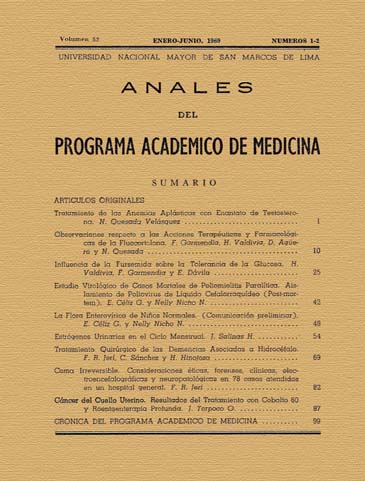Fursemida Influence on glucose tolerance
DOI:
https://doi.org/10.15381/anales.v52i1-2.5104Abstract
We have investigated the effect of Fursemida on glucose tolerance in 82 patients : 14 mormales , 15 cirrhotic , 15 diabetics, 7 patients with cardioesclerosis , 8 with hypertension , 8 nephropathy without failure and 15 with failure, for which administered daily 80 me . diuretic for one week. In 8 patients (4 diabetic , cirrhotic March 1 with hypertension ) occurred a pathological increase in basal glycemia. Except with nephropathy , elevated in all groups glycemia curves was observed , which was not significant in normal , diabetic , and cirrhosis . In cardiac patients the increase was noticeable but not statistically significant . In the hypertensive group the appearance of a greater number of abnormal curves was observed, mean difference at 90 ' and 120' was statistically significant. Patients with renal failure, most of whom had abnormal tolerances , showed declines and even normalization of tolerance curves after administration of Fursemida . These findings , although to a lesser extent , also observed in cases of nephropathy without failure. Abnormalities in tolerance curves showed no correlation with changes in serum electrolyte levels , uric acid , amylases, or with changes in body weight and urine volume . We discuss about the mechanisms of hyperglycemic Fursemida and other diuretics , as well as the paradoxical effect found in uremic . Special emphasis is placed on the possibility that intracellular electrolyte changes are responsible for the variations in the metabolism of carbohydrates produced by them. It concludes practical Fursemida that is a diuretic , which can be administered in patients with intolerance to hydrate carbon s no danger of decompensation occurs. Moreover it is necessary to take caution abnormal glucose curves in patients receiving Fursemida , since this does not necessarily mean that they are diabetic .Downloads
Published
1969-06-16
Issue
Section
Trabajos originales
License
Copyright (c) 1969 Héctor Valdivia, Fausto Garmendia, Enrique Dávila

This work is licensed under a Creative Commons Attribution-NonCommercial-ShareAlike 4.0 International License.
Those authors who have publications with this magazine accept the following terms:
- Authors will retain their copyrights and guarantee the journal the right of first publication of their work, which will be simultaneously subject to Creative Commons Attribution License that allows third parties to share the work as long as its author and its first publication this magazine are indicated.
- Authors may adopt other non-exclusive licensing agreements for the distribution of the version of the published work (eg, deposit it in an institutional electronic file or publish it in a monographic volume) provided that the initial publication in this magazine is indicated.
- Authors are allowed and recommended to disseminate their work over the Internet (eg: in institutional telematic archives or on their website) before and during the submission process, which It can produce interesting exchanges and increase quotes from the published work. (See El efecto del acceso abierto ).
How to Cite
1.
Valdivia H, Garmendia F, Dávila E. Fursemida Influence on glucose tolerance. An Fac med [Internet]. 1969 Jun. 16 [cited 2025 Jun. 15];52(1-2):25-41. Available from: https://revistasinvestigacion.unmsm.edu.pe/index.php/anales/article/view/5104



